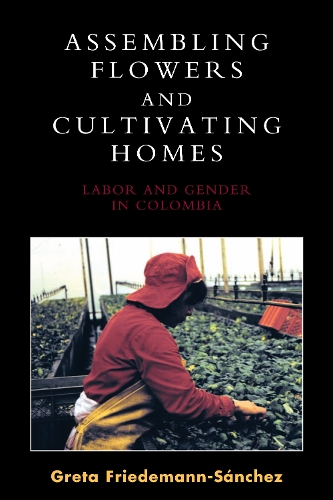
Assembling Flowers and Cultivating Homes: Labor and Gender in Colombia
(Paperback)
Publishing Details
Assembling Flowers and Cultivating Homes: Labor and Gender in Colombia
By (Author) Greta Friedemann-Snchez
Bloomsbury Publishing PLC
Lexington Books
13th October 2008
United States
Classifications
Tertiary Education
Non Fiction
Gender studies: women and girls
338.17596609861
Physical Properties
Paperback
230
Width 155mm, Height 236mm, Spine 12mm
322g
Description
Colombia is a major exporter of fresh-cut flowers. As in other global assembly line industries, women constitute a majority of Colombia's floriculture workforce. This ethnographic study explores the links between agro-industrial employment in the context of economic adjustment programs and the individual experience of employment and economic change at the household level. Author Greta Friedemann-Snchez's challenges the current academic consensus that transnational assembly line industries reinforce patriarchal ideologies of reproduction and the exploitation of women. What from a global perspective may be perceived as exploitation can be seen from the local perspective as an opportunity within the community. Specifically, the study focuses on how the interrelated factors of formal employment, wage income, property ownership, social capital, and self-esteem articulate with women's resistance to male dominated households and domestic violence. Expertly combining qualitative and quantitative methodologies, Assembling Flowers and Cultivating Homes contributes greatly to the study of gender and power, household economics and structure, and Latin American society.
Reviews
In this important contribution, Greta Friedemann-Snchez challenges the notion that women are simply exploited by jobs in the global assembly line. Instead, she provides a nuanced analysis of how women use jobs in Colombia's flower industry to resist subordination at home and challenge traditional household structures where men control the household resources, including women's time and where domestic violence is widespread and accepted. This book will challenge us to rethink the relationships between the global economy and women's well-being. -- Cheryl Doss, Yale University
This is an important and timely book. It offers a textured account of how gendered forms of labor are not only at the heart of global competitiveness but are also an instrument for crafting new identities and options for women workers. * Feminist Economics *
Anthropologists, feminists, and many others argue that gender exploitation provides the competitive edge for off-shore production. Greta Freidemann-Snchez insightfully challenges this common wisdom in her study of Colombia's flower industry. Women, she finds, seek work in the flower companies, find satisfaction in their jobs, and use their monetary power to refashion gender relations. Friedemann-Snchez ingeniously blends different methodologies and theoretical approaches with feminist economics and ethnography to illuminate the contemporary situation for the reader. -- Stephen Gudeman, University of Minnesota
Author Bio
Greta Friedemann-Snchez is assistant professor at the Hubert H. Humphrey Institute of Public Affairs at the University of Minnesota.
